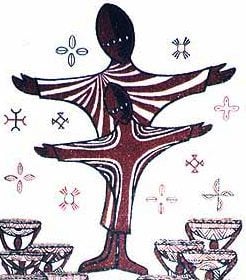 Three weeks ago, in the first of three articles I outlined what I believe to be a way to move beyond the zero-sum games that shape public discourse. Relying on game theory, I pointed out that while there are viable ways of talking about an infinite game that does not presuppose a belief in God, for Christians the best way forward is to nurture what we might call “God’s infinite game.”
Three weeks ago, in the first of three articles I outlined what I believe to be a way to move beyond the zero-sum games that shape public discourse. Relying on game theory, I pointed out that while there are viable ways of talking about an infinite game that does not presuppose a belief in God, for Christians the best way forward is to nurture what we might call “God’s infinite game.”
That game is theocentric and is predicated on the conviction that we are all made in the image of God. It also assumes that when we lapse into zero-sum games, we “distort and attenuate what we can learn about God and – because we are made in the image of God – about one another and ourselves.” I concluded by noting that in “an age of rage,” it will not be easy for Christians to advocate for God’s infinite game. “Fundamentalists of both the left and right will ignore or reject those efforts. They will argue that it betrays the orthodoxies of their respective camps, and both will argue that a theocentric agenda fails to take ‘the current crisis’ seriously. But God’s infinite game has always drawn that kind of criticism and this should not surprise or discourage us.”
In a second article, I turned my attention to the question of where this infinite game is played, arguing that “the infinite game that God invites us to play is to be played out in the body-life of the church. It is there that God’s game is recognized. It is there that those who play are recognized as having been made in the image of God. It is into that game that others are invited to play. It is also there that the healing of God’s image is achieved, if the church is faithful in the game that it has been invited to play.” I also noted that by thinking that the Infinite Game is played on the national stage, Christians have infantilized the church and introduced zero sum games into the life of the church itself.
So, what does a church do that plays the infinite game? The answer could easily occupy a book-length reflection. But a handful of observations may begin to capture what is involved:
Above all, a church that plays God’s infinite game has a singular focus: To know God and to embody that knowledge. This, and nothing else, is the generative center of the infinite game. Baptized into the body of Christ, Christians are embarked on a journey that is shared organically and ontologically with those – past, present, and future – who have had the same experience. Together, they depend upon that journey to understand what the game requires of them. This is because the journey is defined by its destination, which is the life of God in Christ, and because the wisdom that informs that journey – the rules of the game, if you will – can only be known by giving ourselves to a deep acquaintance with God that transforms us.
Any construal of the infinite game that begins elsewhere, then, is always far too narrow. Without a clear sense of the church’s central calling and a singular commitment to it, the church lapses into alien preoccupations. Most of those preoccupations are not bad in and of themselves. Relationship-building, support, encouragement, resources for engagement with the needs of the world – these are all valuable endeavors. But they are not the focus of God’s infinite game, they are derivative, and they are informed by the journey into God in Christ. By contrast, when anyone of those derivative concerns moves to the center of the church’s life they distort and diminish the infinite game.
In an important sense, this is the tension that was at the heart of the dispute between Jesus and his contemporaries. The Pharisees, for example, sought to be faithful, but the Holiness code moved to the center of their practice, eliminating or minimizing other insights into the nature of God which might have qualified their approach to God’s infinite game. By contrast, Jesus’s attitude toward the Law was governed by an immediate and divine authorization for what he taught. As a result, at times he appeared to demand more than his contemporaries and at other times he appeared to set the Law aside. This was not a programmatic approach to interpreting the law, but a dedication to the infinite game: An unlimited willingness to listen. This tension is not unique to the debate between Jesus and the Pharisees. In fact, those early stories probably retained their potency because the same tension is latent in every individual.
For faith communities truly committed to the infinite game, then, it is critical to remain forever open to the corrective that arises out of that willingness to listen.
By definition, churches that play the infinite game prioritize listening and discernment. They re-examine the way that they make decisions, ferreting out any trace of the zero-sum game. They attend to those who are unseen and unheard, welcoming them into the game. They focus on the healing of relationships, with God and with one another, aware that in the infinite game described in Genesis One, the two are inextricably connected. In their dedication to this game, churches of this kind are eager to re-examine their lives, seeking fresh ways to inhabit the divine life into which they have been invited.
In the end, those churches will also gladly risk themselves. This is no small challenge and we may be experiencing a watershed in the time of Covid-19.
A recent article chronicled the care that an Episcopal priest provided for a parishioner who was dying in the hospital. Unable to enter, the priest gave the man last rites by phone, while the man’s sons laid hands on him. I have no doubt about it: The rector and the man’s family acted with integrity, love and deep faith. But I wonder if we will not look back on this time as the point at which the medical community and the government finally built a firewall between us and our parishioners, and forever changed the pastoral and sacramental space that the church is called to fill.
Years ago, with three other colleagues I was involved in a writing project that traced the ways in which the earliest developments in modern medicine slowly and surely came between the sick and dying, their families, and the church. I can’t shake the feeling that this intervention is now complete. Having been told for years, “Stand over there” while the real care is offered, now we have been told, “You shall not enter.”
Implicitly, then, God’s infinite game has been called into question. Never in history, as far as I know, have clergy been told “You shall not enter” and we have willingly complied. I have no doubt that we need to curtail the spread of Covid-19. I have no doubts about the role that social distancing plays in helping to advance that cause, and I have no doubt that there are adjustments that we can make (and have made) in the name of helping to “flatten the curve” of the disease.
But it appears we have entered new territory, and the church should be clear about the incompatibility of society’s game and the one we are called to play.
[This article is the third in a trilogy and what will follow is a biblical and theological rationale for playing “God’s Infinite Game”]
Photo by André Noboa on Unsplash










